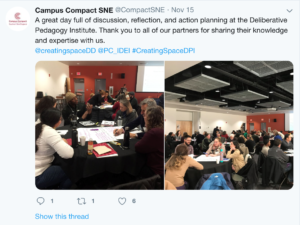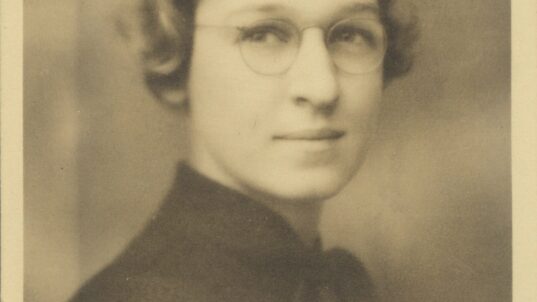Why do we need deliberative pedagogy? The short answer is that we can’t solve complex social problems if we can’t get together and talk about them. It seems simple, right? But in our current era of political polarization and retreat into comfortable, familiar social bubbles—where do we get together to have genuine interactions with people who have different opinions, views, and values? And have we lost (if ever collectively had) the skills to productively talk with one another once we are at the table together?
 The Deliberative Pedagogy Institute: Creating Space for Democracy, hosted by Providence College and co-sponsored by Campus Compact for Southern New England, offered a full-day workshop on November 15th for faculty, staff, students, and administrators designed to deepen their understanding of current campus-based democratic practices that foster dialogue, inclusion, and civic action at colleges and universities.
The Deliberative Pedagogy Institute: Creating Space for Democracy, hosted by Providence College and co-sponsored by Campus Compact for Southern New England, offered a full-day workshop on November 15th for faculty, staff, students, and administrators designed to deepen their understanding of current campus-based democratic practices that foster dialogue, inclusion, and civic action at colleges and universities.
Through plenary sessions, workshops, and networking, participants were able to:
- Learn about various approaches to dialogue and deliberation;
- Develop an understanding of “what works” to empower students to talk across differences, build leadership, and practice civic agency; and
- Build a network and relationships with practitioners.
Presenters at the Deliberative Pedagogy Institute represented some of the leading voices of the deliberative democracy movement, including representatives from Everyday Democracy, Essential Partners, the National Coalition for Dialogue and Deliberation, New Hampshire Listens, the National Issues Forums Institute, the Sustained Dialogue Campus Network, and the Interactivity Foundation.
IF fellow, Shannon Wheatley Hartman, facilitated a workshop on “How to Design a Course That Empower Students to Be Facilitators of Exploratory Discussion.” Using IF pedagogy, modules, and a Facilitation Workbook, participants explored how best to incorporate student facilitation into the classroom and “level up” skills and capacity to then organize campus-wide and community-based exploratory discussions. To learn more about IF educational approaches and materials, please contact Shannon Wheatley Hartman at [email protected]
Also available for purchase on Amazon is the Creating Space for Democracy: A Primer on Dialogue and Deliberation in Higher Education.


